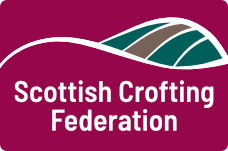Ahead of his visit to the Scottish Crofting Federation’s annual gathering in Stornoway this Saturday, SCF Chief Executive, Donna Smith, has written to the Scottish Government’s Minister for Agriculture, Jim Fairlie MSP, to raise concerns about the newly introduced calving interval condition in the Scottish Suckler Beef Support Scheme.
For a calf to be eligible for support under the Suckler Beef Support Scheme, from next year crofters have to comply with the so-called “calving interval conditionality”. Under the new policy, a calf must be either the first offspring of a cow or born no later than 410 days since its mother has given birth the last time. Over time, the interval is planned to decrease – the rationale behind this is, in plain language: that a cow should not stand idle contributing to greenhouse gas emissions without producing any meat and surely if we are to measure emissions, we need to consider the whole system, and that means inputs. Even putting the one-size-fits-all ideology behind this aside, at our roadshows, crofters have repeatedly voiced concerns about the conditionality potentially discriminating against crofters.
Crofters are very often in a situation where they are not equally capable of controlling breeding cycles in the same way a conventional lowland farmer can – for various reasons including heightened exposure to severe weather conditions and the reliance on functioning transport links, including ferries. While this is partly remedied by a higher support rate for calves born on the Islands, crofters are still in a disadvantaged position if they cannot meet the calving interval condition for reasons beyond their control. Many crofters do not have their own bull but instead rely on hired bulls, either from fellow farmers or crofters, or via the Scottish Government’s Bull Hire Scheme. If a bull does not arrive as scheduled or does not work on the first attempt, this will influence the calving interval without any fault on the crofter’s part.
Donald “Sweeny” Macsween, crofter from Ness, well known from the BBC Alba Series “An Lot/The Croft”, has only recently witnessed a situation where crofters could be disadvantaged by the new rules without any fault on their part because of delays with the Bull Hire Scheme:
“The Ness Crofters group had initially hoped to receive the bull around 15th or 16 August 2024, the same date as we received the 2023 bull, but we were informed that we would get him on 21st August 2024. All had been arranged and I was due to meet the lorry in Stornoway to collect the bull. We were aware of a poor forecast and hoped that plans would still be able to proceed but it wasn’t possible.
The morning sailing from Ullapool was cancelled, so the bull was loaded up later on in the day and was en route to the evening sailing when we were informed that livestock would not be permitted on the sailing. We waited for updates for when they could try again but transport was not available until we received him on Wednesday 4th September, as he came over on a lorry attending the sheep sale at Lewis & Harris auction mart that day. I collected him at 7.30am and took him directly to one of our group members.
At this point we were already 21 days behind our expected dates and any cattle that were bulling in that time were missed. If a cow had been bulling in the days immediately prior to the bull’s arrival, she could end up getting pregnant almost 50 days later than intended. Any delays in moving the bull between group members could also have knock-on effects, particularly later on in the year when work commitments mean it’s only possible to move a bull on a Saturday and winter storms could force further delays. Those at the end of the hire rota could be 30 to 40 days later than planned.”
This example clearly shows that, without any adjustments, the new conditionality requirement can bring crofters into a difficult position. Many crofters are operating on a tight margin already, and with the insecurity over future support, there is a risk that they will withdraw from the system and stop keeping cattle altogether.
Jonathan Hedges said: “Given the importance of cattle for environmental outcomes in High Nature Value areas, and the clearly expressed desire of all political parties to better support small producers throughout the parliamentary debate on the Agriculture and Rural Communities Bill we urge the government to revisit our previous proposal for a small herd derogation for herds up to 10 head for the 2026 claim period.”
“We also ask the government to monitor the effects of the policy on small herds and businesses located in the Highlands and Island region, and to publish detailed information on the performance of the bulls provided by the Bull Hire Scheme in terms of timeliness according to schedule of success rate.”
Jonathan Hedges continued: “We look forward to welcoming Jim Fairlie at our Gathering in Lewis on Saturday to further discuss the challenges faced by crofters under the new agricultural policy in general, and specifically with regard to the calving interval.”




